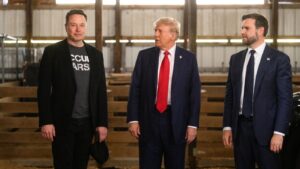President Trump’s economic strategy has been a focal point in recent discussions, with significant developments around tariffs, trade agreements, and a substantial spending bill currently under Senate review.
Tariffs and Trade Dynamics
In a bid to reshape international trade relations, the Trump administration has implemented a series of tariffs. These measures are aimed at correcting what the administration perceives as unfair trade practices and imbalances. The tariffs have sparked varied reactions globally, with some countries expressing concerns over potential trade wars, while others have engaged in negotiations to seek exemptions or adjustments.
Trade Agreements Under Negotiation
Amidst the tariff discourse, the administration is also actively pursuing new trade deals. These agreements are intended to bolster economic ties and expand markets for American goods. The focus is on creating conditions that favor U.S. industries and workers, aligning with President Trump’s “America First” policy. Specific details of these negotiations remain fluid, as talks are ongoing with multiple international partners.
Senate Deliberates Massive Spending Bill
Another crucial component of the economic policy is the extensive spending bill awaiting Senate approval. This bill encompasses a wide array of funding allocations, targeting infrastructure improvements, defense enhancements, and social programs. Supporters argue that the bill is necessary to stimulate economic growth and address critical national needs, while opponents caution about the potential for increased national debt.
The outcomes of these economic policies and legislative efforts are being closely monitored, as they hold significant implications for the U.S. economy and its role on the global stage.







Be First to Comment